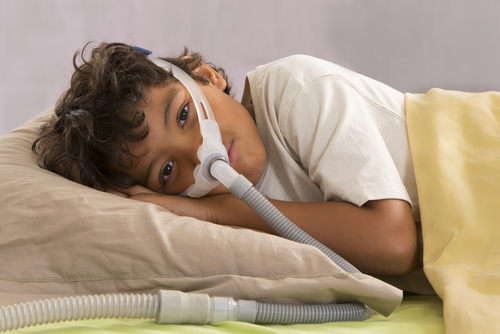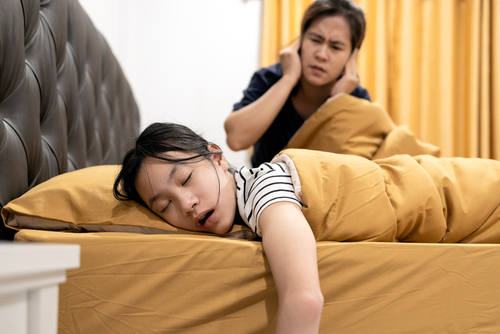Overcoming Childhood Sleep Apnea
Sleep is essential for the healthy growth and development of children. Unfortunately, some children suffer from sleep disorders, and one of the most common ones is sleep apnea. Sleep apnea in children can have significant consequences on their overall health and well-being.
Our Windsor, CT sleep specialist, Dr. Roberta Garceau offers safe and effective sleep apnea treatments to help your child overcome sleep apnea.

Symptoms of Sleep Apnea in Children
Recognizing the symptoms of sleep apnea in children is crucial for early detection and intervention. Common signs and symptoms may include:
- Loud Snoring: Persistent and loud snoring is often the most evident symptom of sleep apnea in children.
- Pauses in Breathing: Parents may notice that their child’s breathing stops for a few seconds during sleep.
- Restless Sleep: Children with sleep apnea may toss and turn frequently during the night and experience fragmented sleep.
- Mouth Breathing: Sleep apnea can cause children to breathe through their mouths instead of their noses while asleep.
- Daytime Fatigue: Due to disrupted sleep, children may exhibit excessive daytime sleepiness, leading to decreased attentiveness and poor performance in school.
- Behavioral Problems: Sleep apnea can contribute to irritability, mood swings, and difficulties in controlling emotions.
- Sleepwalking or Bedwetting: In some cases, sleep apnea may be associated with sleepwalking or bedwetting.
Causes of Sleep Apnea in Children
Several factors can contribute to the development of sleep apnea in children, including:
- Enlarged Tonsils and Adenoids: The most common cause of sleep apnea in children is enlarged tonsils and adenoids, which can obstruct the airway during sleep.
- Obesity: Excess weight can lead to narrowing of the airways, increasing the risk of sleep apnea.
- Structural Abnormalities: Children born with structural issues in the face or neck region may experience airflow restrictions during sleep.
- Neuromuscular Disorders: Certain neuromuscular conditions can weaken the muscles responsible for keeping the airway open during sleep.
- Family History: Genetics may also play a role in the development of sleep apnea in some children.


Treating Sleep Apnea in Children
The treatment of sleep apnea in children depends on the underlying cause and severity of the condition. Some common treatment options include:
- Adenotonsillectomy: If enlarged tonsils and adenoids are causing sleep apnea, surgical removal may be recommended.
- Positive Airway Pressure (PAP) Therapy: Continuous Positive Airway Pressure (CPAP) or Bi-level Positive Airway Pressure (BiPAP) machines can help keep the airway open during sleep.
- Weight Management: For obese children, weight loss and a healthy lifestyle can significantly improve sleep apnea symptoms.
- Orthodontic Treatment: In cases where structural issues contribute to sleep apnea, orthodontic intervention may be beneficial.
- Positional Therapy: Encouraging children to sleep in specific positions that promote better breathing can be helpful in mild cases.
- Medications: In some instances, medication may be prescribed to address underlying medical conditions that contribute to sleep apnea.
Frequently Asked Questions
Is pediatric sleep apnea fatal?
Recognizing the symptoms of sleep apnea is the first step to helping your child get the quality sleep they deserve. After which, we can evaluate your child to determine the best course of treatment for their unique needs.
Can children outgrow sleep apnea?
That’s why it’s crucial to seek treatment at the first sign of the sleep disorder. Contact our Hartford office at (860) 254-6189 to learn more about pediatric sleep apnea and schedule your child’s consultation.
Can sleep apnea affect a child's academic performance?
Is snoring always a sign of sleep apnea in children?
Safeguard Your Child’s Sleep and Well-being!
Sleep apnea in children is a condition that requires attention and timely intervention to ensure a child’s healthy growth and development. Recognizing the symptoms, understanding the causes, and seeking appropriate treatment are essential steps in managing this sleep disorder effectively. By addressing sleep apnea early on, parents and caregivers can significantly improve a child’s overall well-being and quality of life, promoting better sleep and optimal health throughout their growing years. Contact our Windsor, CT sleep specialist today by giving us a call at (860) 254-6189.
